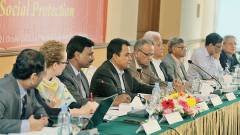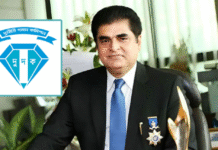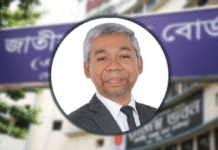Only 17% of Bangladeshi migrant workers have their formal job contract papers in their possession, according to a research finding.
Referring to a research report prepared in 2014, World Bank’s lead economist Zahid Hussain said the findings showed that private recruiting agencies heavily rely on middlemen to recruit potential migrants from rural Bangladesh.
The study covered 3,054 migrant households and 3,12,0 potential aspiring migrants.
He revealed the findings at a dialogue on Safeguarding Interests of Bangladesh Migrant Workers: Issues of Financial Inclusion and Social Protection, which was jointly organized by Ministry of Expatriates’ Welfare and Overseas Employment, Centre for Policy Dialogue (CPD) and the International Labour Organisation (ILO) in the city yesterday.
CPD Board of Trustees member and former advisor to the Caretaker Government Syed Manzur Elahi moderated the event.
“One of the crucial findings in this survey was that less educated and unskilled workers go through the middlemen for migration,’’ said the World Bank lead economist.
Financial loss associated with failed attempt to migrate is about US$392 on an average, which means $250 medium, according to the findings.
“This is like you pay money to middlemen and you lose it,” said Hussain.
Actual wages per hour was Tk110 against an expected wage of Tk125 and this 12% difference is because of both working higher number of hours than he was told and lower wages than they were promised, he said quoting the survey.
“The middlemen channel is the riskiest channel of all, out of all other alternative channels. But, again one has to be careful because reducing reliance on middlemen is bit simplistic. It is simplistic because the middlemen deliver migration faster,” he said.
Planning Minister AHM Mustafa Kamal said Bangladeshi people are much better than any other countries like Philippines.
The minister, however, said the main problem is our people cannot speak English. A Sri Lankan worker is getting 60 to 65 % higher wages than Bangladeshis because they are able to speak English.
“The government is collecting information if remittances are spent only on household consumption or any other investment for ensuring effective use of it,” said the minister.
Bangladesh Employers’ Federation President Salahuddin Kasem Khan said a study report showed 40% skilled workers in 2010 had gone abroad, but it dropped 34% in 2012. “This is something that the government should look at.”
He underscored the need for operationalisation of human resource development fund for producing skilled labour forces.
Minister for Expatriates’ Welfare and Overseas Employment Nurul Islam said migrant workers are the driving force for achieving middle income country.
He said there are 41 training centres and six institutes marine technology where people are being trained up for going abroad.
He said state-owned Probashi Kallyan Bank (Expatriate Welfare Bank) would be turned into scheduled bank for making migration cost zero.
Presenting a keynote paper, CPD executive director Mustafizur Rahman said issues of migration and remittances have become very important in the context of some of the recent global development.
In the global forum, migration and remittances are recognised as major tool for graduation from LDC country to middle income country.
According to his paper, from 1971, about 9.5 million workers have left the country at different time.Migrant workers contributed 7.4% of total national income and 5% of the country’s total work force is working abroad.
Only 0.15% of total development and non-development expenditure was spent for the development of migrant workers.
Most of the investment goes to construction purposes and less than 1% of remittances are saved in the government various institutions, said the keynote paper.
Source: Dhaka Tribune











The study n Seminar is the real reflection on expetriate human semi/unskilled bangladesh migrant work force. The core lies on understanding the policy maker at the National level not alone on PM/Prime Minister. We should learn to say white to white n black to back tt I mean real things n findings to resolve issues with honesty n dedication